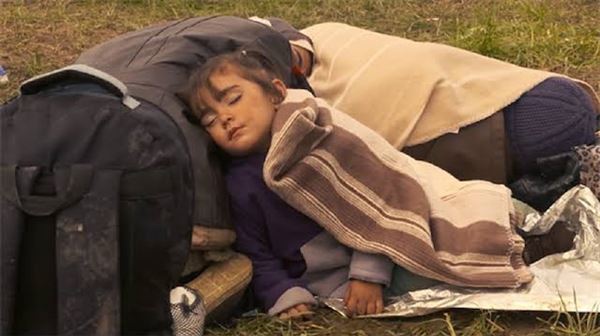Dozens of irregular migrant children, aged 12-17 and taking shelter in the Vucjak refugee camp near the Bihac city of Bosnia and Herzegovina, are stru
Dozens of irregular migrant children, aged 12-17 and taking shelter in the Vucjak refugee camp near the Bihac city of Bosnia and Herzegovina, are struggling to survive in harsh winter conditions.
These children who are on the journey with either their relatives or friends from their villages struggle to live under harsh winter conditions in which air temperature drops to minus 10 Celsius.
But they all have one mutual dream that keeps them united against the inhumane conditions, which is the dream of reaching their relatives who live in European countries such as Belgium, Italy, and France.
These children, unlike their peers in different countries of the world, do not play child games, and they lack parental affection.
15-year old Pervaz who left his country Afghanistan nine months ago told Anadolu Agency that he wants to reach his relatives living in Belgium.
Mohammed, 17, said he traveled to Greece from Turkey by boat in very difficult conditions.
“I don’t want to stay here. I tried to cross into Croatia three times, but each time I was caught and sent back,” said Mohammed.
Meanwhile, a 15-year-old resident of Pakistan, Rezvan was captured just recently, on Thursday night, captured by Croatian police and returned to Bosnia.
Rezvan dreams of reaching Italy and finding a job and sending money to his family back in Pakistan.
Up to 500 refugees living in the Vucjak Camp have lived under difficult conditions already, but the arrival of winter has taken their grievances to another level.
The refugees in the camp — only 15 kilometers (9.3 miles) off the EU-member Croatia’s border — urge Croatian officials to allow entrance so that they can proceed to European countries such as Germany, France, the Netherlands and Italy.
As they have not been allowed to advance to such countries, the camp residents have rejected the food delivered by the Red Cross for the past three days, and take shower with the water obtained from melting snow and warm up with the wood they collect from the nearby forest.
A placard stands in the middle of the camp, calling on the officials to extend a helping hand: “We are dying here. We want the EU to open its borders.”
Although the authorities earlier suggested changing the camp location, no concrete steps have been taken in the camp where there are piles of trash.
The camp residents can not find drinking water and not even able to walk properly due to mud.
Bosnian authorities have sought solutions to protect child migrants, while the relocation of child migrants in the Vucjak Camp to better-facility camps already began. Some children were already transported to other camps.
An immigration center near Mostar city is envisaged for the placement of child migrants where a total of 180 migrants, including children without families and with families, are already present there.
Since the beginning of 2018, Bosnia and Herzegovina has been subject to heavy influx of immigrants as a country in transition route to EU member states.
It is estimated that there are still over 7,000 irregular migrants in the country.
* Writing by Talha Ozturk from Belgrade
